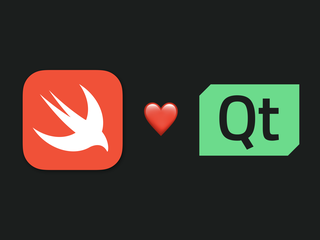Swift 6.2 and Qt6 Interop
Posted by:
-

Konstantin
My first encounter with Qt took place before I was even a developer. Way back in high-school (think 2003), I was discovering KDE 3 with a CD of Linux Mandrake that happened to be in one of the monthly PC Magazine editions. Konqi and I have been friends for a very long time.

You've probably heard that Swift 6.2 comes with some extensive upgrades to its ability to interop with C++ and I wanted to try it out.
Please meet, QwiftUI - Experiment to create a Swift UI-like library based on Qt6.
The motivation for this was a multi-platform app I'm currently working on, which will eventually require a version for both Windows and Linux. The app is currently built in Swift (and some parts in Rust).
While researching, I stumbled on https://swiftcrossui.dev - an excellent open-source library which offers a SwiftUI-like DSL for Swift apps backed by various graphics stacks like GTK, WinUI and others. What it doesn't have (yet 😏) is a Qt6 backend!
QwiftUI is my attempt to assess building such an integration by taking advantage of Swift's latest C++ interop capabilities.
Some constraints I set for this project:
- No additional tooling or build systems - let's try to use only swift features. Qt often requires pre-generation of some resources, let's see if it's feasible to bake that into the library so that `swift build` can take care of it all. There was already a comment with a suggestion that the library can take advantage of Swift's pkgconfig support.
- No additional dependencies - let's see if the effort required to write out the wrappers is acceptable for a standalone, dependency-free package.
The choice to begin with Qt Widgets was mainly so that I can get a sense of how things would work out given Swift 6.2’s C++ native interop. My goal was to evaluate if it’s possible to bridge Qt while still using swift tools (e.g. without the need to bring-in CMake, or other packaging) and the possibility to get to a Swift DSL that would feel familiar to developers already using SwiftUI.
I will share some more as the library matures. My background on the front-end has always been focused on building apps for Apple platforms and Linux.
My encounters with Qt6 (PyQt6) have always been positive. Qt is one of those "hardened for decades" versatile toolkits that one would be happy to work with!

Swift and Qt